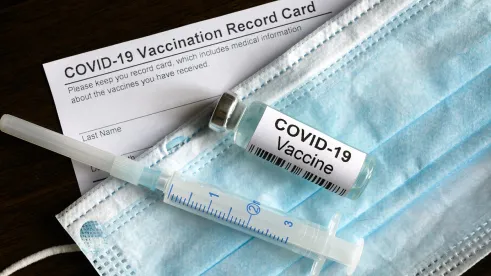The number of U.S. workers choosing to be vaccinated plateaued earlier this summer. As a result, employers, many of which hoped to return employees to the workplace in early fall, were left to debate whether to require employees to get vaccinated or to merely “strongly encourage” vaccination. Although many mandatory vaccination policies may pass legal scrutiny, they may nonetheless raise cultural tensions and raise the risk of losing employees in an already tight labor market.
For these and other reasons, many employers have delayed implementation of mandatory vaccination policies and instead have attempted to incentivize their employees to get vaccinated. For example, employers have offered paid time off, gift cards, cash, and other financial incentives to motivate their employees to get more fully vaccinated. The results of these efforts appeared to have been effective initially, but vaccination rates have stalled as of late. Moreover, once the Delta variant began driving up infection rates and hospitalizations, employers started looking for other ways to boost vaccination rates among their employees. In particular, employers may be wondering—if the carrot had not driven up the vaccination rates among employees, would the stick work?
In response, some employers have started adding health coverage surcharges for unvaccinated employees as a way to increase vaccination rates. A vaccination surcharge of $20 to $50 per month would be in the same range as the surcharge some employers impose on smokers. While surcharges are intended to motivate employees to get vaccinated, they also address the issues employers may experience when employees become ill with COVID-19. As President Joe Biden noted in a recent speech, long-term COVID-19–related medical issues “can sometimes rise to the level of a disability.”
Employers that are considering whether to implement a surcharge may want to first examine their workplace cultures. Employers may want to determine whether such a measure—which some employees might view as punitive—could cause employees to quit, and thus whether in the balance of issues, that is an acceptable outcome.
Employers may also want to look at the context in which the “stick” would be applied. If it is a matter of an added cost to a health care premium, which applies only to those unvaccinated employees who are enrolled in the company’s health plan, the program would be covered by the Health Insurance Portability and Accountability Act (HIPAA) wellness rules. Employers considering such a move may want to be mindful of the HIPAA limits on financial incentives and provide a reasonable alternative standard for employees who cannot get vaccinated due to an adverse health status factor.
If an employer, instead, considers reducing or deducting from employees’ pay (which are two distinct approaches) instead of imposing additional charges on employee health plans, the majority of states would not allow such deductions. Employers considering these approaches may want to carefully review the laws of the relevant jurisdictions in which they would intend to implement them.
As the Delta variant continues to spread, employers hoping to avoid implementing mandatory vaccinations will likely continue to examine ways to encourage as many employees as possible to get vaccinated. If these programs fail to move the needle sufficiently, more employers may find the mandatory route attractive.




 />i
/>i

